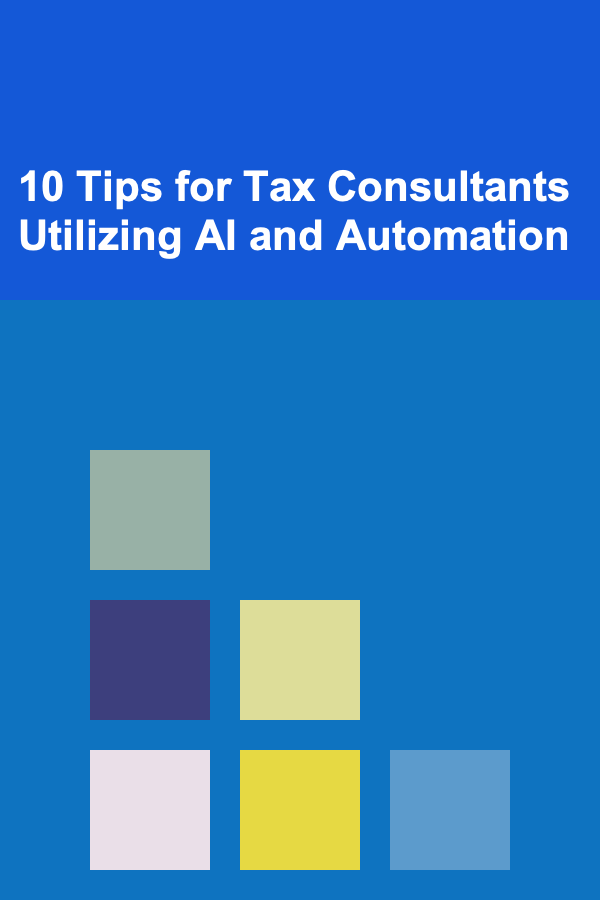
10 Tips for Tax Consultants Utilizing AI and Automation
ebook include PDF & Audio bundle (Micro Guide)
$12.99$8.99
Limited Time Offer! Order within the next:

In the modern world of finance and accounting, tax consultants are constantly under pressure to optimize their work processes, reduce errors, and deliver faster, more accurate results for their clients. The introduction of Artificial Intelligence (AI) and automation into the tax consulting field presents an incredible opportunity to streamline workflows, improve accuracy, and increase efficiency. In this article, we will explore how tax consultants can utilize AI and automation effectively, providing 10 valuable tips to help them make the most of these transformative technologies.
Leverage AI for Data Extraction and Analysis
One of the most time-consuming tasks for tax consultants is manually extracting relevant data from documents, forms, and financial records. AI-driven optical character recognition (OCR) and natural language processing (NLP) tools can automate this process, extracting data from scanned documents, invoices, receipts, and other forms with high accuracy.
Why It's Useful:
AI-driven data extraction tools can significantly reduce the time spent on manual data entry, allowing tax consultants to focus on higher-value tasks such as strategy, client consultations, and tax planning.
Tip: Implement an AI-powered OCR tool to automatically extract information from various documents, such as tax returns, financial statements, and receipts. Ensure that the tool is customizable to your clients' specific needs and is integrated with your existing accounting software.
Automate Routine Tax Filing Tasks
Tax filing is an essential part of a tax consultant's work, but it often involves repetitive tasks that can be easily automated. AI-powered automation tools can handle basic filings such as personal income tax returns, corporate tax returns, VAT submissions, and other regulatory forms.
Why It's Useful:
Automating routine tax filings can reduce human error, speed up the process, and free up tax consultants to focus on more complex and strategic work.
Tip: Adopt tax software that integrates AI to automatically fill in tax forms based on client data and ensures compliance with the latest regulations. This can reduce the risk of missed deductions, late filings, and other errors that can cost clients money.
Use AI for Tax Risk Identification
Tax consultants are responsible for identifying potential risks in their clients' financial records and advising them on how to mitigate those risks. AI and machine learning (ML) tools can be used to detect anomalies in financial data, helping consultants identify areas that may be prone to audit risk or non-compliance.
Why It's Useful:
AI-powered risk analysis tools can review vast amounts of financial data in seconds, highlighting potential tax issues such as underreported income, improper deductions, or discrepancies in expense reporting. This reduces the time spent manually reviewing documents and improves accuracy.
Tip: Implement AI tools that can flag high-risk transactions and areas of concern in client records. These tools can highlight potential red flags such as mismatched data, tax code violations, or unusual deductions that may attract unwanted attention from tax authorities.
Enhance Client Communication with Chatbots
Effective communication is key to successful client relationships. Chatbots powered by AI can assist tax consultants in providing timely responses to client inquiries, automating the process of answering frequently asked questions (FAQs), and scheduling meetings.
Why It's Useful:
AI chatbots can handle a high volume of basic client inquiries, allowing tax consultants to focus on more complex issues. This improves client satisfaction by providing quick responses and reducing wait times for clients.
Tip: Deploy a chatbot on your website or integrate it into your client portal to assist with appointment scheduling, document submission, and FAQs. This will streamline communication and improve the overall client experience.
Utilize AI for Tax Planning and Strategy
AI can be incredibly beneficial when it comes to tax planning and strategy. By analyzing a client's financial data, AI-powered tools can offer personalized tax-saving strategies, suggest optimal filing statuses, and identify opportunities for deductions and credits that a consultant may have missed.
Why It's Useful:
AI can analyze vast amounts of financial data more efficiently than a human can, uncovering hidden opportunities for tax optimization. Additionally, AI tools can help tax consultants build personalized strategies tailored to each client's unique financial situation.
Tip: Implement AI tools that analyze a client's financial history and predict future tax liabilities. Use these insights to help clients make informed decisions about tax planning, investment strategies, and retirement planning.
Automate Client Document Collection and Management
The process of collecting and organizing client documents can be a daunting task, particularly when clients provide documents in different formats. Automation tools can streamline the document collection process by allowing clients to upload necessary documents via secure online portals, and AI can sort and organize them based on their relevance.
Why It's Useful:
Automation can eliminate the need for back-and-forth communication regarding missing documents. It ensures that all necessary documents are submitted on time, reducing the administrative burden for both consultants and clients.
Tip: Set up a secure online portal where clients can upload documents directly. Use AI to automatically categorize and store these documents, ensuring that they are easily accessible when needed.
Embrace AI-Powered Analytics for Decision Making
Tax consultants can benefit from AI-powered analytics tools that provide insights into a client's financial performance. These tools can offer real-time analytics on cash flow, profit margins, tax obligations, and other financial metrics, helping consultants make data-driven decisions that optimize tax outcomes.
Why It's Useful:
AI-driven analytics can provide deeper insights into financial data, allowing tax consultants to make more informed decisions for their clients. This results in better tax planning and improved client satisfaction.
Tip: Invest in AI-powered financial analysis software that can integrate with your clients' accounting systems to provide real-time insights into their financial health. Use this data to make strategic tax planning recommendations.
Implement AI for Compliance Monitoring
Tax laws and regulations are constantly changing, and staying up-to-date with these changes can be a challenge for tax consultants. AI tools can help monitor compliance by automatically flagging any changes in tax laws, reporting requirements, or industry regulations.
Why It's Useful:
AI-driven compliance tools can ensure that tax filings are up-to-date with the latest regulations, reducing the risk of penalties and audits for clients. These tools can also help consultants stay informed about changes in tax laws that may affect their clients.
Tip: Use AI tools that track regulatory changes and alert you when there are updates to tax laws or reporting requirements. This ensures that your tax filings are always compliant with the latest regulations.
Streamline Billing and Invoicing with Automation
Billing and invoicing can be tedious tasks for tax consultants, especially when dealing with multiple clients and projects. Automation tools can simplify the invoicing process by generating and sending invoices automatically, based on the time spent on a client's case or project.
Why It's Useful:
Automation of billing and invoicing saves time and reduces the chances of errors. It also ensures that clients receive accurate invoices in a timely manner, improving cash flow for the consultancy.
Tip: Implement an automated billing system that integrates with your time tracking and project management tools. This ensures that all billable hours and services are accurately captured and invoiced to clients.
Enhance Security with AI and Automation
Security is a top priority for tax consultants, particularly when dealing with sensitive financial data. AI-powered cybersecurity tools can help protect your business and your clients from cyber threats by monitoring for suspicious activity and flagging potential vulnerabilities.
Why It's Useful:
AI tools can identify potential security risks, such as data breaches, phishing attempts, or unauthorized access, in real-time. These tools can automatically take action to mitigate risks, helping tax consultants safeguard their client's financial information.
Tip: Implement AI-powered cybersecurity tools to monitor for unusual activity and prevent unauthorized access to sensitive client data. Regularly review and update your security protocols to ensure that you are protecting your clients' information.
Conclusion
AI and automation present exciting opportunities for tax consultants to enhance their practices, improve efficiency, and provide more value to clients. By leveraging AI for data extraction, risk identification, tax planning, and compliance monitoring, consultants can streamline their operations and reduce errors. Additionally, automation tools for document collection, billing, and client communication free up valuable time, allowing tax consultants to focus on more strategic tasks.
Implementing these 10 tips will not only improve the quality of service provided to clients but also position your tax consulting firm for long-term success in an increasingly digital world. As technology continues to evolve, those who embrace AI and automation will stay ahead of the competition and deliver the best possible outcomes for their clients.
Reading More From Our Other Websites
- [Organization Tip 101] How to Prepare Your Fishing Gear for Travel
- [Personal Care Tips 101] How to Make Your Hair Smell Fresh with Dry Shampoo
- [Home Staging 101] How to Maximize Space in a Small Home with Staging
- [Home Party Planning 101] How to Organize a Themed Potluck Party at Your House
- [Personal Finance Management 101] How to Start an Emergency Fund from Scratch
- [Personal Care Tips 101] How to Make Body Lotion Work for Your Skin's Specific Concerns
- [Digital Decluttering Tip 101] Tools and Apps That Automate Unsubscribing: Save Time and Reduce Clutter
- [Home Family Activity 101] How to Set Up a Family Home Olympics for Bonding
- [Skydiving Tip 101] From Gear to Grace: A Beginner's Guide to Fun Skydiving Sessions
- [Scrapbooking Tip 101] Best Ideas for Incorporating Pressed Flowers --- A Gentle Guide to Preserving Their Beauty

How to Implement a Daily Workspace Cleaning Routine
Read More
How to Plan for Breaks in Your Study Schedule
Read More
How To Stay Ahead of Algorithm Changes
Read More
Top Tips for Planning Shopping Trips to Avoid Impulse Buying and Stick to Your Budget
Read More
How to Manage Your Finances as a Digital Nomad
Read More
10 Tips for Creating a Wildlife-Friendly Landscape
Read MoreOther Products

How to Implement a Daily Workspace Cleaning Routine
Read More
How to Plan for Breaks in Your Study Schedule
Read More
How To Stay Ahead of Algorithm Changes
Read More
Top Tips for Planning Shopping Trips to Avoid Impulse Buying and Stick to Your Budget
Read More
How to Manage Your Finances as a Digital Nomad
Read More